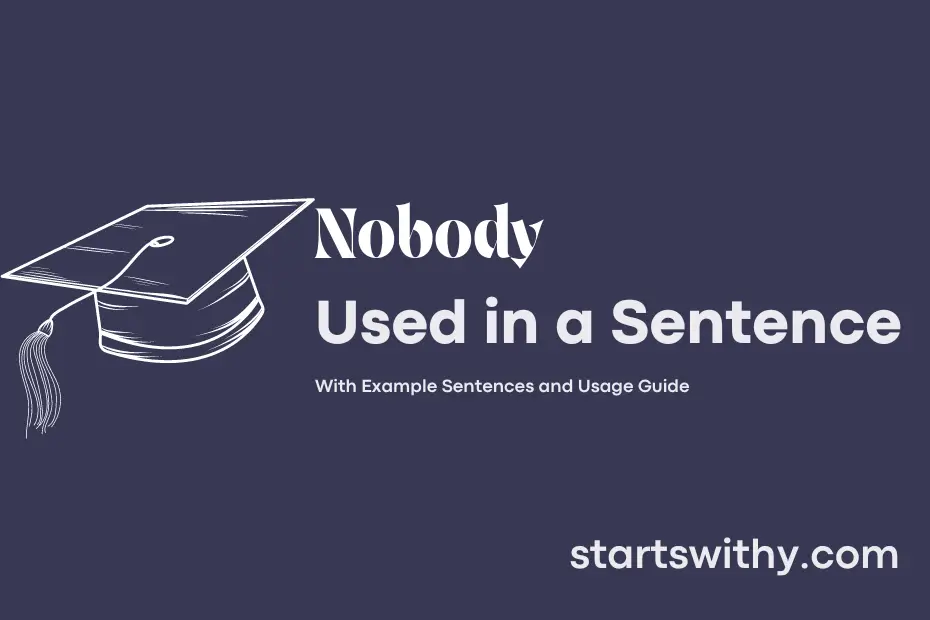Have you ever struggled with understanding when to use “nobody” in a sentence? Let’s clear up any confusion. “Nobody” is a pronoun that refers to no person; no one at all. It is commonly used to indicate an absence of people in a situation or to emphasize the lack of any specific person.
Using “nobody” in a sentence can help convey a sense of emptiness or absence, highlighting the lack of individuals in a particular scenario. Understanding the nuances of how to use “nobody” correctly can enhance the clarity and impact of your communication.
7 Examples Of Nobody Used In a Sentence For Kids
- Nobody is allowed to go out without permission.
- Raju said, “I saw nobody near the tree.”
- Nobody knows the answer to this question.
- Anjali felt scared when she saw nobody at home.
- Nobody wants to play with the broken toy.
- The teacher asked, “Did nobody do their homework?”
- At night, nobody should walk alone in the park.
14 Sentences with Nobody Examples
- Nobody wants to miss the deadline for submitting their assignment.
- Nobody likes getting stuck in traffic on their way to college.
- Nobody enjoys writing long essays for their exams.
- Nobody appreciates a noisy roommate when trying to study.
- Nobody wants to be caught plagiarizing in their research paper.
- Nobody is looking forward to taking a difficult exam next week.
- Nobody wants to deal with a malfunctioning printer before a presentation.
- Nobody likes it when the cafeteria runs out of their favorite food.
- Nobody wants to forget their laptop charger on a crucial day.
- Nobody enjoys group projects where not everyone contributes equally.
- Nobody wants to have a power outage during a virtual lecture.
- Nobody likes it when the Wi-Fi signal is weak during an online exam.
- Nobody wants to oversleep on the day of an important class presentation.
- Nobody wants to deal with a leaking water bottle in their bag.
How To Use Nobody in Sentences?
To use Nobody in a sentence, simply replace the subject of the sentence with it. Nobody is used to refer to no person or not a single person. For example:
-
” Nobody is perfect.” (Here, Nobody is used as the subject of the sentence to indicate that no person is perfect.)
-
” Nobody likes to be alone.” (In this sentence, Nobody is used to state that not a single person enjoys being alone.)
-
” Nobody brought an umbrella, so we all got wet.” (In this sentence, Nobody indicates that no person brought an umbrella.)
Remember that Nobody is a pronoun that is used to refer to an absence of people. It can help you make statements or ask questions where no specific person is the subject. When using Nobody in a sentence, be sure to pay attention to the verb that follows it. The verb should agree with the use of Nobody as a singular pronoun. Practice using Nobody in different sentences to become more comfortable with incorporating it into your everyday communication.
Conclusion
In conclusion, the concept of “nobody” in sentences can emphasize the absence of a particular person or group, highlighting themes of solitude, emptiness, or even anonymity. For example, “Nobody was present during the meeting, causing delays in decision-making,” illustrates a situation where the lack of someone’s presence had a tangible impact. Utilizing “nobody” in sentences can convey a sense of loneliness, exclusion, or non-existence, influencing the tone and meaning of the statement.
Overall, sentences featuring “nobody” serve to draw attention to the absence of an individual or individuals, shedding light on their significance or impact within a given context. By emphasizing the lack of presence or involvement, these sentences prompt reflection on the role that individuals play in different situations and underscore the importance of their influence or contributions.



